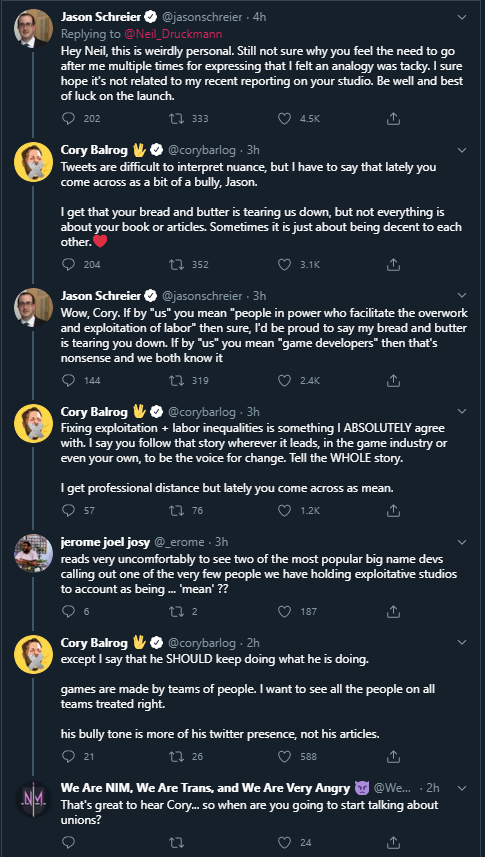Should games reviews acknowledge poor studio conditions?
By sweep 141 Comments
As I'm sure many of you are aware Kotaku/Jason Schreier ran a pretty revealing and insightful piece into the shitty studio conditions over at Naughty Dog. For those of you that aren't up to speed, here's the highlights;
- Naughty Dog encouraged rolling crunch for months at a time causing widespread burnout and depression among their developers
“It’s an amazing creative environment,” said one developer on The Last of Us II. “But you can’t go home.”
- Senior management seemed uninterested in addressing the concerns of their staff and actively pushed them to keep working. This led to long-standing employees leaving, with management assuming they were all replaceable, and this further exacerbated production deadlines.
Every newcomer means weeks’ or months’ worth of training and hard lessons about how the rest of the team works. A task that might take a veteran designer two hours could take twice or three times as long for a newer employee, and it can be hard to know what the directors want until you’ve been working there long enough.
- Senior management also seem to think that crunch is performed as a completely voluntary artist-driven sacrifice without acknowledging the overwhelming pressure and fear of job security, and no acknowledgment of the detriment to mental and physical health:
“People just naturally do it,” [president, Evan] Wells said. “Because we hire a particular type of person who’s motivated and passionate and wants to leave their mark on the industry. That’s why they come to Naughty Dog.”
Naughty Dog’s managers would never tell people to work overtime—it was always an implication, understood and accepted by everyone.
None of this is new
Rockstar North went through the same revealing reporting around both GTA4, and then again years later with GTA5. Everyone knows that videogame studios treat their artists like garbage, to the extent that it's more surprising when we hear about positive studio conditions than negative ones. I work in VFX and we have exactly the same problems - when production falls behind it's the people at the bottom of the ladder picking up the slack. The shitty economy means people will overwork out of fear of losing their jobs, and management either encourages it or simply turns a blind eye as the team works themselves to death. Overtime will usually be unpaid, and weekend work is expected as a default rather than a last resort. It sucks, and we've been desensitized to it.
So, what are the responsibilities of journalists, and game reviewers, and us as consumers?
Should studio conditions be taken into account when reviewing games? Do we have an ethical responsibility as consumers to hold these devs to account?
I mention this as a result of a tense exchange between Schreier and a couple of prolific writers, Neil Druckman (Naughty Dog, The Last Of Us) and Cory Barlog (Santa Monica Studio, God Of War) after another writer compared the Last Of Us 2 to Schindlers List, and Druckman expressed his frustration at the consequential (and very deserved) sarcastic internet reaction:

Petty squabbling aside, the implication here is that Schreier is being vindictive in his reactions to The Last Of Us 2 as a result of his expose on their work conditions. Is that justified? Is that something you'd like to know about when reading the review of a game, or is it something that you think should impact the score of a game?
Also, as an aside, the way those devs reacted here is bullshit and they should both be extremely embarrassed. Mean? Get the fuck out.
Personally I feel mistreatment of staff should be acknowledged in a review, as that's the only way to enforce meaningful change short of not buying the game. I'd go as far as to say that it's the ethical responsibility of journalists and reviewers to call out developers on their shitty work-culture, even while acknowledging the quality of a videogame.
I expect the answer will be for a lot of people that if a game is objectively good then the ends justify the means. Increasingly, I'm less and less happy with that mentality, and it's going to be hard to shift the bitter taste that comes from knowing the cost of The Last Of Us 2, regardless of how great that game may be.
